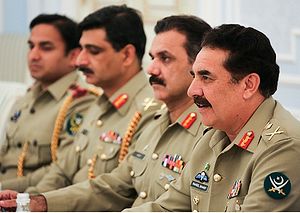Since his retirement in November last year, General Raheel Sharif has left behind a respected and popular legacy in Pakistan. He can be credited for a remarkable decline in terrorist incidents domestically. That said, his appointment as chief of the Saudi Arabia-led Islamic Military Alliance has raised quite a few eyebrows.
The IMA is similar to the Rapid Deployment Joint Task Force initiated by the Carter Administration in the late-1970s to secure the stability of the oil-rich Gulf region. Raheel Sharif’s appointment also becomes questionable given the sectarian nature of conflicts in the Middle East, especially given the fact that countries such as Iran and Syria are not part of the IMA,
According to the latest reports, Sharif had set three preconditions prior to taking up the command of the 39-nation military alliance. The first condition was the inclusion of Iran in the alliance to ensure that the IMA does not assume a sectarian character. The second was the condition that he will not work under anyone’s command. Finally, the third was reportedly that he would act as an arbitrator to promote greater harmony in the Muslim world.
While these reported conditions act as counters to the apprehensions that many observers have expressed regarding his appointment, the fact remains that the IMA is still an overtly Sunni alliance without Iranian participation. The alliance is also spearheaded by Saudi Arabia with its headquarters in Riyadh, and with the recent souring of relations between both Iran and Saudi Arabia, it would be difficult to imagine that the alliance will be anything more than a continuation of proxy warfare between both regional powers in the Middle East.
This appointment also contradicts Pakistan’s national commitment towards neutrality with regard to the Yemen crisis after a parliamentary resolution was passed in April 2015. The Yemen intervention, also known as Operation Decisive Storm, was a Saudi Arabia-led crackdown against Houthi rebels and was more about a power struggle centering on reinstating Yemen’s dictatorship of President Abdrabbuh Mansur Hadi rather than cracking down on terrorism. Hence, it would be fallacious to assume that the IMA will not assume a sectarian character.
The procedural aspects of the former Pakistani chief of army staff’s appointment aside, the fact that the alliance seeks to carry out counterterrorism operations in Iraq, Syria, Libya, Egypt, and Afghanistan, particularly with Syria witnessing the consolidation of power of an Alawite government under President Bashar Al Assad recently, hints at how geopolitics in the region will play a significant role in shaping the IMA’s role. The catastrophic effects of regimes being toppled throughout the Middle East had led to great instability in the form of rebel movements and insurgencies that ultimately have assumed a sectarian character.
For Pakistan, tackling terrorism at home is a top priority for civilian leadership and the military establishment. That said, if the preconditions of joining the alliance are not met, Sharif will most likely withdraw from command of the IMA. His appointment, however, will continue to be questionable on grounds of neutrality.
Hamzah Rifaat was a 2016 South Asian Voices Visiting Fellow at the Stimson Center and has represented Pakistan as a member of the CTBTO Youth Initiative of 2016 in Vienna.

































